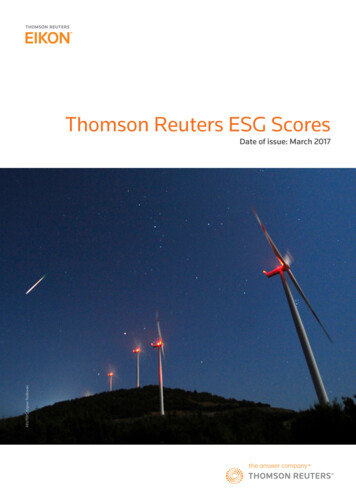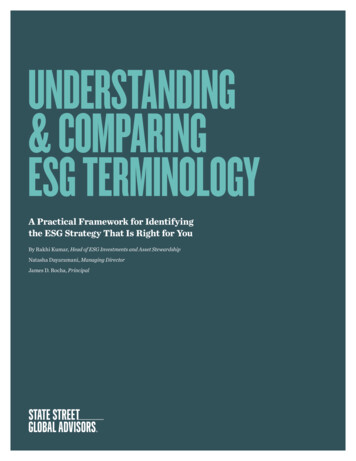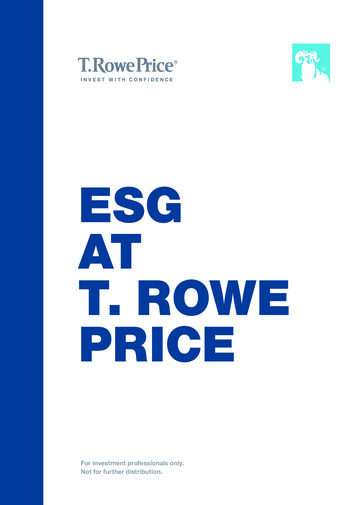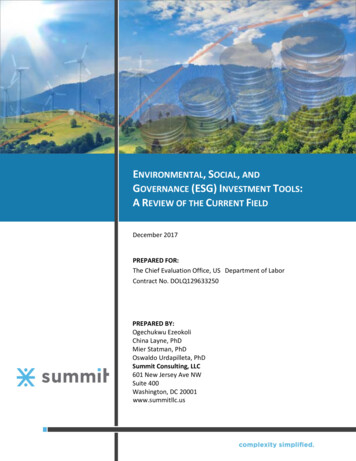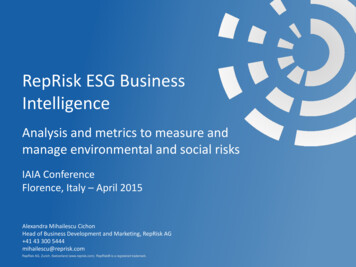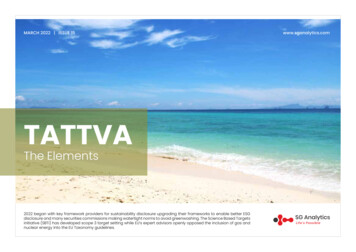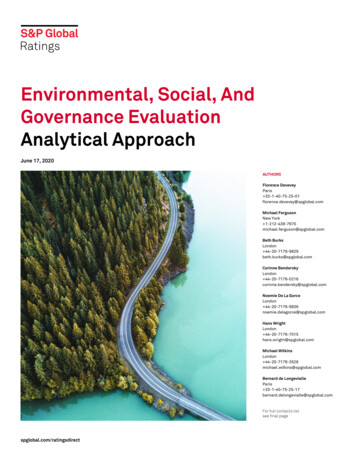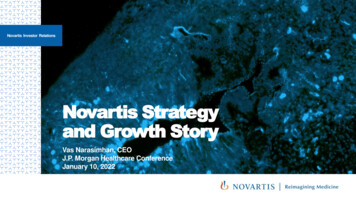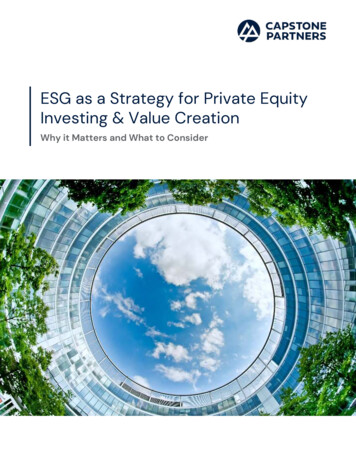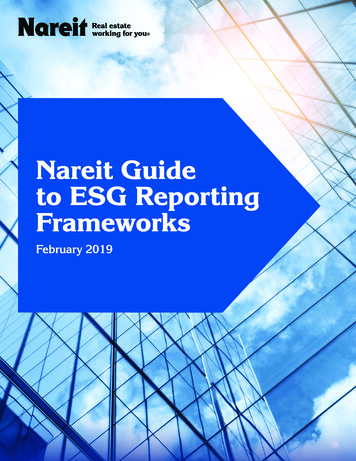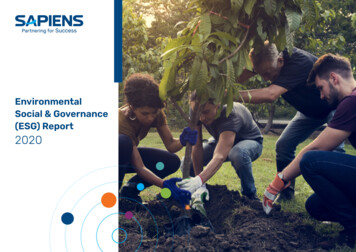
Transcription
ESG Company OverviewNovember 2020InvestorValero.com
Contents1Business Overview and Operations2ESG Summary3Refining4Renewable Fuels5Guiding Principles6E: Environmental7S: Human Capital, Safety andCommunity8G: Governance1
BUSINESS OVERVIEW & OPERATIONSESG SUMMARYREFININGRENEWABLE FUELSGUIDING PRINCIPLESLargest Global Independent Refiner and NorthAmerica’s Largest Renewable Fuels ProducerLargest globalindependentrefinerManufacturer andmarketer oftransportationfuels and productsthat are essential tomodern lifeEnvironmentallyresponsibleoperationsSafety is ourfoundation forsuccessLowest-cost producer*Processing of crude oil and other feedstockscorn ethanolproducerdiesel producer**275 million gallons15 petroleum refineries3.2 million barrels perday throughput capacity*World’s 2ndlargestWorld’s 2ndlargest renewable14 ethanol plants inper yearthe U.S. with acombined productioncapacity of 1.7 billionUp to 80% reduction in life cycleGHG emissionsProduces lowcarbonintensityrenewablediesel fromrecycled animalfats, usedcooking oil andinedible corn oilgallons per year100% compatiblewith existingengines andinfrastructureExpanding to 675million gallons peryear in 2021Low-carbon fuel sold inthe U.S., Canada and EuropeClean-burninghigh-octanerenewable fuel withlower emissionsUp to 30%reduction inlife cycle GHGemissions20% share of U.S. ethanolexports in 2019Low-carbon fuel well-positionedfor export growth**Joint venture with Darling Ingredients Inc.2
BUSINESS OVERVIEW & OPERATIONSESG SUMMARYREFININGRENEWABLE FUELSGUIDING PRINCIPLESValero’s VisionOur products fuelmodern life and make abetter future possible.Fortune 32company 10,000employeesNYSE:Headquartered inSan Antonio, TexasVLOWHAT FUELSUSHOW WE FUELTHE WORLDOURVISIONWe relentlessly pursue excellence; holdourselves to the highest standards ofsafety, operations and integrity; and careabout the environment, our employeesand the communities where we workand live.We are the best-in-class producer ofessential fuels and products that arefoundational to modern life.The world needs reliable, affordable andsustainable energy. We are advancing thefuture of energy through innovation,ingenuity and unmatched execution.3
BUSINESS OVERVIEW & OPERATIONSESG SUMMARYREFININGRENEWABLE FUELSGUIDING PRINCIPLESGlobal UNITEDSTATESPERULIMAWHOLESALE MARKETING PRESENCEBRANDED WHOLESALE PRESENCEVALERO REFINERIESVALERO ETHANOL PLANTSVALERO TERMINALSDIAMOND GREEN DIESELSAN ANTONIOPIPELINESWIND TURBINESCOGENERATION PLANTS(1 under construction)MEXICO CITY4
BUSINESS OVERVIEW & OPERATIONSESG SUMMARYREFININGRENEWABLE FUELSGUIDING PRINCIPLES2019 ESG SummaryEENVIRONMENTALRenewable fuelsalong with blendingRobustand credits offsetEnvironmentalmore than 10 millionManagementmetric tons of refiningSystemScope 1 and 2 GHGemissions Largest renewable fuels producer inNorth America (more than 2.7 billioninvested) Best year ever for environmentalincidents, flaring, intensity of energyuse and GHG emissions intensity In 2019, we recycled more than 17times the amount of fresh waterwithdrawn for refining operationsSSOCIALRecognized as one ofWorld’s BestEmployers, America’sBest Large Employersand Best Employers forWomen by ForbesGGOVERNANCEMore than 64 million indonations andfundraisingOperationalexcellence and bestyear for refineryemployee safety Focus on diversity, inclusion andprofessional development High employee volunteerism ( 150,000hours) 2019 Economic support: 10,000employees, 2.6 billion spent onmaintenance and growth projects; 4 billion on refining materials andservices; and 700 million taxes paid5 directors representboard diversity ingender and race,3 are women Strong corporate governance Board oversight of risks andcompliance, including climate-relatedrisks Committed to ESG engagement All-employee bonus program includesESG initiatives5
Largest GlobalIndependent RefinerRefining 2020 Valero. All rights reserved.
BUSINESS OVERVIEW & OPERATIONSESG SUMMARYREFININGRENEWABLE FUELSGUIDING PRINCIPLESThe Lowest Cost Operator in a Highly CompetitiveIndustryValero’s Refineries15petroleumrefineriesFuels marketedthrough bulk andwholesale network3.2 millionbarrels perday throughputcapacityBest-in-classproducer of fuelsand products thatare essential tomodern lifeApproximately 6,000employees inrefineryoperations7,000independentlyowned outletscarrying our brandnamesOver 130 millionbarrels of activeshell capacityfor crude oil andproductsOver 3,000miles ofOver 50 docksactivepipelines7
BUSINESS OVERVIEW & OPERATIONSESG SUMMARYREFININGRENEWABLE FUELSGUIDING PRINCIPLESInvesting in our Assets and Reducing our EnergyConsumption Lowers our Operating CostsLowest-cost producer whilemaintaining high mechanicalavailabilityRefining Cash Operating ExpensesPer Barrel of ThroughputSafety is our foundation for success,with our best year ever in 2019for refinery employee safety 1.7 billion in 2019 in capital expendituresto sustain our operations(excludes turnaround and D&A expenses)Peer Range 7.00Investments in technological advances andpredictive maintenance, and prioritizationof lower emissions and reduced energyuse deliver operations excellenceBeyond Compliance: 3.00201020122014201620182020(1)Industry Leader in refineryVoluntary Protection Program StarSites, a voluntary program,regarded as OSHA’s highest plantsafety designation(1) 2020 refiningcash operating expenses per barrel of throughput through September 30. Peer groupincludes PSX, MPC, HFC, and PBF.8
BUSINESS OVERVIEW & OPERATIONSESG SUMMARYREFININGRENEWABLE FUELSGUIDING PRINCIPLESComprehensive Roadmap to Further Reduce Emissionswith Projects in Execution1.431.82011 Base Year 2025 Target(Scope 1 & 2) (Scope 1 & 2)63%28.74.7Million Metric Tons CO2e35.8Absolute Reductions and Offsets through Existing Board Approved Projects20%Metric Tons CO2e / Thousand BOEGHG Emissions Intensity Target(Scope 1 & 2))5.97.911.9VLO RefiningGHG Emissionsin 2011(Scope 1 & 2)2011-2025 AbsoluteEmissions Reductionthrough Efficiencies(Scope 1 & 2)2025202520252025GHG Emissions Offset GHG Emissions Offset GHG Emissions OffsetVLO Refining GHGby VLO Ethanolby VLO Renewable by Global Blending ofEmissions afterProductionDiesel Productionand Credits fromReductions & OffsetsRenewable Fuels(Scope 1 & 2)Targeting to reduce and offset Scope 1 and 2 GHG emissions by 63% through investments in Board approved projects,with the potential to achieve 72% by 2025 with projects subject to Board approvalSee slide 63 for notes regarding this slide9
North America’s LargestRenewable Fuels ProducerRenewable Fuels: Renewable Diesel Ethanol 2020 Valero. All rights reserved.
BUSINESS OVERVIEW & OPERATIONSESG SUMMARYREFININGRENEWABLE FUELSGUIDING PRINCIPLESRenewable Fuels: Low-Carbon Life Cycle GHG EmissionsCombined, our renewable dieseland ethanol production along withour blending and purchase ofrenewable fuels creditsoffset more than10 MILLIONmetric tons ofglobal refining GHG emissionsScope 1 and 2 in 2019.For context, that represents an32%offset ofof our global refiningGHG emissions Scope 1 and 2 in 2019.See slide 63 for notes regarding this slide11
BUSINESS OVERVIEW & OPERATIONSESG SUMMARYREFININGRENEWABLE FUELSGUIDING PRINCIPLES 2.7 Billion Invested in Low-Carbon FuelsWorld’s 2nd largestrenewable diesel producerWorld’s 2nd largestcorn ethanol producer 1 billion invested and committedin renewable diesel since 2013* 1.7 billiontotal ethanolinvestment14275 million gallons per year withan expansion to increaseproduction to 675 milliongallons per year in 2021Ethanol plantownership hasdoubled sincethe initial7-plantacquisitionin 200910117200920102014201840% of Growth Capex is allocated to renewable or low-carbon projects in 2020 and 2021*Note: Joint venture with Darling Ingredients, investment represents Valero’s 50% share12
BUSINESS OVERVIEW & OPERATIONSESG SUMMARYREFININGRENEWABLE FUELSGUIDING PRINCIPLESRenewable Diesel Reduces Life Cycle GHG Emissionsup to 80%World’s 2nd largestrenewable dieselproducerRenewable dieselis 100% compatiblewith existinginfrastructure as well aslight, medium andheavy duty enginesUses recycled animalfats, used cooking oil,inedible corn oil and/orvegetable oil to producelow-carbon intensityrenewable diesel fuel, soldin the U.S., Canada andEuropeProduction Capacity:275 million gallons per year; adjacent to ourSt. Charles refinery to capture synergies andgain access to export marketsExpanding to increase production to675 million gallons per year in 2021Approved production capacity expansion adjacent to our St. Charles refineryGrowth throughinnovation inrenewable projectsA new plant adjacent to our Port Arthur refinery isin the review stage, if approved, production wouldstart in 2024, resulting in total capacity of morethan 1 billion gallons per year13
BUSINESS OVERVIEW & OPERATIONSESG SUMMARYREFININGRENEWABLE FUELSGUIDING PRINCIPLESEthanol offers up to 30% Lower Life Cycle GHG EmissionsValero’s Ethanol PlantsCompared with nonblended gasoline,ethanol offers up to30% lower life cycleGHG emissions1sttraditional refiner toenter large-scaleethanol production14 ethanol plants inthe U.S.with a combinedproduction capacity of1.7 billion gallons peryear1410Ethanol plantsconvert corn11into ethanol,livestock feed(distillers grains andsyrup) and inediblecorn oil72009201020142018World’s 2nd largestcorn ethanol producerEPA EfficientProducer Programfor superior processefficiency*Six sites recognized, three sites pending20% share ofU.S. ethanolexportsin 2019 andgrowing 1,000 employees14
BUSINESS OVERVIEW & OPERATIONSESG SUMMARYREFININGRENEWABLE FUELSGUIDING PRINCIPLESGuiding PrinciplesSafety is our foundation for success.We view our stakeholdersas partners to whom weseek to deliveroperational excellence,disciplined managementof capital and long-termvalue on a foundation ofWe are committed stewardsof the environment.strong governanceand ethical standards.We consider ouremployees a competitiveadvantage and our greatestasset. We foster a culture thatsupports diversity andinclusion, and provide a safe,healthy and rewarding workenvironment withopportunities for growth.We will be a good neighbor bysharing our success with thecommunities where welive and work throughvolunteerism, charitable givingand the economic support ofbeing a good employer.15
llion-dollar capital investments along with continuousimprovement in process safety and reliability have driven downour environmental events to record lowsWorld’s 2ndlargestrenewable dieselproducerWorld’s 2ndlargestethanolproducer50 megawattwind farm avoided830,000 metrictons of carbondioxide emissionsCapturing morethan one millionmetric tons ofcarbonemissions at PortRecord lowflaring, energyuse and emissionsintensityArthur, TX16
ENVIRONMENTALSOCIALGOVERNANCEGrowing our Leadership Position with Low-carbonOpportunitiesAs part of our vision to be the best-in-class producer of fuels and productsthat are essential to modern life, we will continue our efforts to:Focus on safety, reliability and operationalexcellence to deliver transportation fuels andproducts essential to modern life 1.7 billion in sustainingcapex in 2019Strive to reduce emissions, increaseefficiency and invest in opportunities thatimprove our environmental stewardshipWind farm has avoided830,000 metric tons ofcarbon dioxide emissionssince 2009.Lead the industry with multi-billion dollarinvestments in low-carbon markets, currentlyevaluating growth opportunitiesIn 2019, 10 million metric tons ofrefining Scope 1 and 2 GHGemissions were offset by ourrenewable fuels, blending andcreditsExecute a long-term strategy that addressesshifting consumer needs under a changingpolicy and technology landscapeIf approved, by 2024,production of renewablediesel will surpass1 billion gallons a yearFor an assessment of the resilience of our business strategies under a lower-carbon economy consistent with a 2-degree scenario, pleaseread the Review of Climate-Related Risks and Opportunities, which follows the TCFD recommendation.17
ENVIRONMENTALSOCIALGOVERNANCERobust Operational and Environmental ManagementSystemsOur Environmental Management Systems include the following three programs:21Commitment to ExcellenceManagement System (CTEMS)Fuels Compliance3Environmental Excellence andRisk Assessment (EERA) A proprietary systematic approach New operational safeguards, Defines our environmental excellencesoftware, auditing and protocols,that, unlike third partyvision, superior to traditionaland more uniformity across ourmanagement systems, focuses onenvironmental management systemslabs help us reinforce ourresults and not exclusively onin that it assesses design andcompliance with all fuelsplanning and documentation.effectiveness of discrete managementregulationsCTEMS adheres to a “plan-dosystems and returns a score per sitecheck-act” model to achieveexcellence in nine critical elements Focus on product quality, our fuels Customized to our refining complexity,compliance processes areCTEMS and EERA are more relevantdriving safe and reliable operationsfundamental to continue leadingand as effective as generalizedand minimizing impacts onin low-carbon transportation fuelsmanagement systems such as ISOcommunities and the environment14001Our commitment goes beyond regulations18
ENVIRONMENTALSOCIALGOVERNANCEOur Approach to Environmental Management*Key Characteristics of our environmental management systems include:1. ResponsibilityAll Valero refineries haveenvironmental managementstaff dedicated to excellenceand risk mitigation, with theadditional support ofcorporate health, safety andenvironmental staff.2. Risk Assessment3. ComplianceFormal environmental riskassessments are documented,implemented and maintained atevery Valero site. Steps includehazard identification, riskevaluation, analysis and mitigation.To assure compliance with legalrequirements in relation toenvironmental protection,refineries maintain a process tomonitor changing laws andregulations. Responsibilities areassigned at the task level with anowner accountable for ensuringthat regulatory requirements areidentified, communicated andconsistently monitored.*The Health, Safety and Environmental Policy is available in the Investors/ESG section of our website.19
ENVIRONMENTALSOCIALGOVERNANCEOur Approach to Environmental ManagementContinuedKey Characteristics of our environmental management systems include:4. Objectives andContinuous ImprovementRefineries have documentedprocesses for environmentalmanagement, including strategicplanning, goals and objectives.Goals and objectives addresscontinuous improvementopportunities, as well as identifygaps associated with environmentalstewardship. Progress is reviewedat least annually by managementwith input from employees andstakeholders.5. Record Keeping6. TrainingRefineries follow the requirementsof CTEMS, Fuels Compliance andEERA. Each refinery has processesin place to ensure that documentsand records are accessible withspecific processes to identify,manage and maintain records.With the support of corporatetraining, each refinery establishesand implements a program toensure that all employees andcontractors have the necessary skills,training and competency to performassigned duties in anenvironmentally responsible manner.20
ENVIRONMENTALSOCIALGOVERNANCEOur Approach to Environmental ManagementContinuedKey characteristics of our environmental management systems include:7. Monitoring and Communication8. Audits and AssessmentsTo determine if environmental goals and objectives are beingmet, refineries have a process in place to measure andmonitor their operations and activities. The process assessesthe implementation and effectiveness of operationalcontrols, and tracks and evaluates environmentalperformance. It also assures compliance with regulatoryrequirements. Performance measures are generated andmade available periodically. Such measures providemanagement with the tools to understand trends andimpacts, and identify opportunities for improvement.The environmental teams working with each refinery haveestablished and maintained internal and external auditingprocesses to assess the adequacy and effectiveness ofenvironmental controls, compliance with regulations andexceeding those regulations. Joint ventures and contractors areincluded in the auditing process. Audit programs aredocumented and include a process for communicating resultsto management and provisions for periodic review andcorrective actions. Excellence assessments are conducted atfour refineries every year.Ethanol plant in Aurora, SDIn 2019, internal environmental audits were conducted at 16 ofour plants. GHG emissions from stationary sources wereexternally verified at our four facilities in California, Canada andthe U.K. In addition, GHG emissions associated with the use oftransportation fuels sold to low-carbon markets were alsoexternally verified at 2 additional refineries. We use third-partyverification in our fuels program for all our refineries and, alsofor components of EERA.21
ENVIRONMENTALSOCIALGOVERNANCEOur Approach to Environmental ManagementContinuedGovernance and ManagerialResponsibilityThe Nominating/Governance and PublicPolicy Committee of our board of directorsprovides oversight of Valero’s health, safetyand environmental matters as well asclimate-related risks and opportunities. TheCommittee is charged with reviewing anddiscussing with management our focus onenvironmental issues, including emissions,water, waste and compliance. Overseen by asenior executive who reports directly to ourCEO and with direct reporting opportunities tothe Committee, our environmental team isresponsible for environmental strategy, riskassessment and implementation.22
ENVIRONMENTALSOCIALGOVERNANCEOur Excellence Commitment with EERAValero’s Environmental Excellence and Risk Assessment (EERA)defines more than 100 expectations and involves a five-stepprocess using a combination of external assessors and internalsubject matter experts:1. On-site: self-assessment conducted by refineryleadership. Each refinery compares itself torating criteria2. Paper: third-party and in-house subject matterexperts conduct a deep dive in an extensivereview of refinery environmental data andreports in a due-diligence style process3. Technology: technical field assessment usingindustry standards and advanced technologyto evaluate effectiveness in controllingemissions4. Inspection: results from the technology reviewand due diligence process are used by a teamof experts in a substantive on-site inspectionand cultural assessment5. Implementation: final gap assessment reportproduced by experts and leadership team withmitigation pathway and scoring improvementactionsAt the Corpus Christi, TX refinery, a high-tech infrared camera is used to detect emissions as part of the EERA assessment to assure going beyond regulations23
ENVIRONMENTALSOCIALGOVERNANCEEnvironmental MetricsMSCI andSustainalyticsGlobal Refining1201720182019GHG Emissions Scope 1 124.825.424.8GHG Emissions Scope 2 16.86.86.3NOx 29,3009,0008,700SOx 28,8007,7008,800PM10 22,4002,3002,200VOCs 29,50010,3007,700Fresh water withdrawn 3181.2165.8164.1Oil spilled to land ( 1 bbl) 4222514Oil spilled to water ( 1 bbl) 4043Million metric tons CO2e. Global refining represents more than 90% of companywide GHG emissions. Scope 1 is defined as thedirect emissions from global refinery operations2 Million metric tons CO e. Scope 2 is the indirect emissions from purchased electricity and steam23 Million m34 Count of oil spill events to land or water of more than one barrel124
ENVIRONMENTALSOCIALGOVERNANCEEnergy Use: Multiple Renewable SourcesMany of our refineries are powered by a combination of renewable sources fromlocal power grids and our own projectsHydropowerMore than 99% of the electricityused at our refinery in Quebec Citycomes from renewable sources –mainly hydropower, with smallportions from wind, biomass andbiogasWind GenerationAt peak generation capacity,our McKee wind farmproduces roughly 50megawatts, which is what isrequired to run our adjacentrefinery in the TexasPanhandlePurchased Power MixOur refineries in Wilmingtonand Benicia in California havehydropower, wind, solarand geothermal inthe power mixCogen Plants and Other SystemsCombined, our cogenerationsystems and expanders reduceour reliance on 330 megawatts of electricityfrom local power grids25
ENVIRONMENTALSOCIALGOVERNANCEWind Farm: Reducing Emissions and Energy Use50Since 2009, the wind farmhas avoidedmegawatts of powergeneration capacity, partlypowering the McKee Refinery33turbine wind farm in theTexas Panhandle at ourMcKee Refinery, built in2009250feet tall 830,000 tonsof carbon dioxide emissionsEqual to the benefits of planting 80 millioncapitalinvestment 12.5 MILLIONurban trees**Estimated based on EPA’s GHG Equivalencies calculator for urban tree seedlings grownfor 10 years26
ENVIRONMENTALSOCIALGOVERNANCECogeneration Plants and ExpandersBoosting power and environmental performance,and reducing operating expenses Fueled by natural gas, our cogeneration plantsreduce our reliance on local power grids, whichare often less environmentally friendly and morecostly Cogeneration represents a very efficient way ofmaking power, with the steam recycled backinto the refining process for other uses Four cogeneration systems: 2 in California, 1 inTexas and 1 under construction in the U.K. Expanders are installed at 6 of our refineries.Expanders convert kinetic energy into electricityby using exhaust gases to spin turbines Our expanders can displace 600,000 tons ofcarbon dioxide a year that otherwise would begenerated by conventional power providersCombined, our cogenerationsystems and expanders offset 330 megawatts of electricityEnough to power the homes of acity of the size of San Francisco** U.S Census Bureau. Population estimates July 1, 201927
ENVIRONMENTALSOCIALGOVERNANCECarbon Capture: Innovation and New TechnologiesCapturing and Storing Carbon DioxideNational Petroleum Council(NPC) study on scaling carboncapture in the U.S. A member of the NPC, Valero playedan active role in the development ofa 2019 study that sought todetermine the regulatory supportand technology developmentsrequired to deploy carbon capture,utilization and storage (CCUS) atscale in the U.S. The study can befound at dualchallenge.npc.orgAssessing the feasibility ofCarbon Capture in operations Carbon capture opportunitiesinclude high concentrations of CO2streams at ethanol plants as wellas hydrogen production atrefineriesOur Port Arthur refinery hosts a 1million-ton-per-year carboncapture project, an amount equalto the benefits of planting andgrowing 15 million urban treesover 10 years*Nature-based carbon storage Led by Rice University’s BakerInstitute for Public Policy, Valero isa corporate founder of the naturebased carbon market framework The initiative would enable acredit trading market for carbonthat has been stored in soil Additional benefits includeenhanced drought resistance andminimization of flooding*Estimated based on EPA’s GHG Equivalenciescalculator for urban tree seedlings grown for 10 yearsA ranch in the Texas Hill Country where a nature-based carbon storage project is being developed.28
ENVIRONMENTALSOCIALGOVERNANCEInnovative Solutions by Recycling, Reusing,Reclaiming and ReducingMany of our refinery units exist forenvironmental purposes, such asremoval of sulfur. Once extracted, thesulfur is used for a variety of beneficialuses such as crop fertilizer and forpurifying drinking water.At our refineries we treat wastewaterusing specialized bacteria that naturallydigest oil and other components in ourwaste streamsEvery drop counts, recovered productfrom waste materials is converted intohigh-quality fuels.Our headquarters recycled 327 tons ofmaterial in 2019, and regularly recycles20,000 gallons of water per day fromits cooling system for irrigation.Being the most efficient and reliable operator in ahighly competitive industry means being the mostenvironmentally responsible Producing renewable fuelsReducing GHG emissions*Reducing energy consumption*Reusing waste streamsRecovering usable materials*Per barrel of throughput29
ENVIRONMENTALSOCIALGOVERNANCEWater ManagementWater is the most important resource. It is central to our lives and the ecosystem.It is also essential to our business and the ability to provide clean energy to a global society.At Valero, we work to address this global issue locally,through innovative approaches and advanced technology to minimize use and eliminate waste.PolicyWater management is a critical component of our businessand we continue to work with stakeholders to improve our performance by: Taking a risk-based approach to water managementand integrating water strategy and water securityinto our long-term planning and business processes Engaging with local, state and national governments,industry associations, suppliers, regulatory agencies,academia, non-government organizations andcommunities to develop innovative solutions inwater management and conservation Continually assessing and managing regional waterrisks through routine sustainability assessments Protecting existing water resources through soundwater management policies Recycling and reusing water to minimize demands onfresh water sources and improve efficiency30
ENVIRONMENTALSOCIALGOVERNANCEWater ManagementRisk ManagementMost of our water consumption takes place in ourrefining operations. Based on the World ResourcesInstitute’s (WRI) Water Risk Atlas tool, Aqueduct,we determined that two of our 15 refineries arelocated in regions with high baseline water stress.Water scarcity can be a risk to the refining process.Water is needed for cooling and also in the form ofsteam for heating. In addition, water plays animportant role removing impurities fromfeedstocks.We have put in place water conservation andrecycling initiatives, which have yielded significantresults. In 2019, we recycled more than 17 timesthe amount of fresh water we use to support ourrefinery operations, primarily through therecirculation of water in cooling towers.Our water risk-based approach is integrated intoour operational and long-term planning to mitigateand reduce water risks.Reduction and mitigation initiatives include the useor evaluation of reused municipal wastewater fortower cooling purposes, acquisition of securedwater rights and/or desalination plants.We have taken the steps we believe are necessaryto secure our operations in terms of water scarcity.High efficiency cooling towers at the Corpus Christi refinery31
ENVIRONMENTALSOCIALGOVERNANCEWater ManagementEngagementOur participation in various committees of the Water Environment Federation hasenriched our understanding of the value and impact of water conservation, andprovided a platform for water management innovation.At the Benicia, CA refinery, Valero’s David Marrs (left) who received the Water Environment Federation 2020 W. Wesley Eckenfelder Industrial Water Quality Lifetime Achievement Award inrecognition of substantial engineering, scientific or operations contributions to industrial wastewater management over the course of a career.At our refinery in Wilmington,California, we have a signedcontract to take treated municipalwastewater to supplement ourcooling tower makeup water.Upon project completion, we willsave up to 420 million gallons ofpotable water per year.Our wind farm, which powerspart of our McKee refinery, hassaved the equivalent of 700million gallons of water (since itwas built in 2009), as comparedto conventional powergeneration.Our Three Rivers, Texas refinerysends treated wastewater toirrigate fields of hay, which issold to area ranches.Our Corpus Christi, TX, refineriespay into a broad industry fund thatprovides water-supply security andsupports research and plans for theconstruction of a desalinationfacility to serve industrial users.32
ENVIRONMENTALSOCIALGOVERNANCEReporting Frameworks: TCFD and SASB“Our investments in flexible and efficient manufacturing,renewable fuels and the infrastructure critical to our operationshelp us meet today’s needs and prepare for future energy markets.”Full reports available on the ESG section atinvestorvalero.com* TCFD (Task Force on Climate-related Financial Disclosures of the Financial Stability Board)SASB (Sustainability Accounting Standards Board)Prepared under oversight ofour board of directors:1.The Review of Climate-RelatedRisks and Opportunitiesfollows the TCFD*recommendation to assess theresilience of our businessstrategies under a potentialtransition to a lower-carboneconomy consistent with a 2degree scenario.2.Our SASB* report aligns ourperformance with therecommendation of the SASBframework in the Oil and Gas –Refining and Marketingindustry standard.33
Social: Human Capital, Safety and CommunityS 2020 Valero. All rights reserved.34
ENVIRONMENTALSOCIALGOVERNANCEOutstanding Safety PerformanceValero Refineries vs. Other Sectors(Injuries recorded per 200,000 working hours)SOURCES: U.S. Bureau of LaborStatistics, Valero. Industry figures arefor 2019; Valero refinery employeefigure, 201935
ENVIRONMENTALSOCIALGOVERNANCESafety is our Foundation for SuccessGlobal Refining201720182019Personnel Safety Employee 10.280.400.25Personnel Safety Contractor 10.360.320.39Fatality Rate Employee 20.000.000.00Fatality Rate Contractor 20.020.000.00Process Safety Events Rates - Tier 1 30.080.070.05Process Safety Events Rates - Tier 2 30.180.310.17 Employees are our greatest asset Focus on safe, stable and reliable operations Safety and reliability are imperative 2019 was our best year ever in refinery employeesafety performance, with an incident rate well belowthe industry average, as a well as our best year everfor process safety event rateConsistently deliver predictable operating results
BUSINESS OVERVIEW & OPERATIONS ESG SUMMARY REFINING RENEWABLE FUELS GUIDING PRINCIPLES. Valero's Refineries. 3.2 million barrels per day. throughput capacity. Best-in-class producer of fuels and products that are . essential to modern life 6,000 . employees in refinery operations. petroleum . 15. refineries. Over 3,000 miles . of active .
